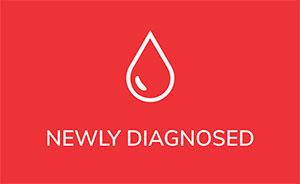Dr. Jan Burger is one of the strong team of CLL doctors from MD Anderson Cancer Center. We caught up in the hall at iwCLL 2019 in Edinburgh, Scotland.
There we discussed the growing recognition of the importance of the B-cell receptor (BCR) in the life cycle of a CLL and healthy B cell.
At its simplest, the B cell receptor is a protein, an immunoglobulin on the surface of the cell that recognizes other specific proteins or antigens.
Until recently, specifically until we developed drugs to block it, the BCR was of only academic interest. Now we realize how critical it is in CLL and how we can control the cancer by controlling its signaling.
Takeaways:
- All B cells, whether normal or CLL, are dependent on getting messages from the BCR that say to stay alive and proliferate.
- When the BCR on the cell surface is stimulated by an antigen, it then sends a survival message to the nucleus that we can now block downstream on its way to the cell’s control center where the DNA lives that makes the proteins needed for survival and proliferation.
- We can do this by blocking the BTK pathway with ibrutinib or acalabrutinib, the two approved drugs in CLL and several others in development, a treatment that has revolutionized the care of CLL.
- Blocking PI3K by the approved drugs idelalisib and duvelisib also is very effective.
- SYK and other pathways are promising targets.
- Blocking the BCR blocks the cell’s purpose in life as B cells are all about communicating with other immune cells. This block leads to cell death and explains the amazing benefit of the novel drugs that disrupt the pathway downstream between the cell surface and the nucleus.
- Approximately 30% of chronic lymphocytic leukemia patients have B-cell receptors with highly similar primary sequences. These nearly identical immunoglobulins are called stereotypical.
- These can be studied to discover if specific therapies and prognostic value might be tailored to a particular subset of patients. See: http://www.haematologica.org/content/haematol/early/2019/12/20/haematol.2019.231027.full.pdf for a more technical discussion directed at hematologists.
- In CLL, the BCR is generally more “turned on’ than in normal B-cells.
Conclusions:
We have cracked an important piece of the biology of the CLL cell and can manipulate it to help patents.
This was not expected. What started as interesting basic science about how B cells communicate has led to medications that have caused a sea change in how we treat CLL and some related B cell lymphomas. It has drastically improved our odds of living longer.
But there is still so much that we don’t understand.
Here is my short interview with Dr. Burger from iwCLL 2019.
For the presentations from iwCLL, see these three, but I must warn you that they are directed to towards CLL researchers and not patients and may not be that easily followed.
Role of the B-Cell Receptor in B-Cell Oncogenesis
Stefano Casola
https://www.iwcll2019.org/2019-presentations/stefano-casola/
Dissecting CLL Immunogenetics and Emerging B-Cell Receptor Stereotypes
Kostas Stamatopoulos
https://www.iwcll2019.org/2019-presentations/kostas-stamatopoulos/
CLL-Specific Aspects of B-Cell Receptor Signaling
Graham Packham
https://www.iwcll2019.org/2019-presentations/graham-packham/
Stay strong, we are all in this together
Brian Koffman

















